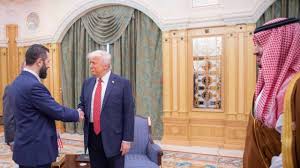In a scoop, Axios reveals that Israeli Prime Minister Benjamin Netanyahu has asked the United States to mediate negotiations with Syria’s new government, led by former Islamist commander Ahmad al-Sharaa. The request was made during a meeting last week with U.S. envoy Tom Barrack, according to two senior Israeli officials who spoke to Axios.
The talks would mark the first direct engagement between Israel and Syria since 2011 and signal a dramatic turnaround in Israeli policy. Netanyahu now seeks a phased process starting with a revised security arrangement and potentially culminating in a peace agreement.
According to Axios, the Israeli government had initially reacted with alarm to the fall of the Assad regime and the rise of a Turkish-backed leadership in Damascus. Israel responded militarily—neutralizing Syrian air defenses and occupying parts of southern Syria—and warned the U.S. against rushing into engagement. But the ground shifted after President Trump’s surprise meeting with Sharaa in Saudi Arabia last month, where he announced the lifting of all U.S. sanctions on Syria.
This American shift encouraged Israeli officials to reassess. As Axios reports, secret contacts between Israel and the new Syrian government have already taken place, first through intermediaries and now via direct talks in third countries.
Despite concerns about Sharaa’s background, Israeli officials now describe him as pragmatic and independent of Ankara. “It is better for us that the Syrian government is close to the U.S. and Saudi Arabia,” one official told Axios.
Barrack, Trump’s envoy to Syria and a longtime confidant, visited both Damascus and Jerusalem in recent weeks. In Syria, he reopened the U.S. ambassador’s residence and declared the conflict with Israel “a solvable problem.” In Israel, he toured the Golan Heights with Netanyahu and senior military officials, and discussed Israeli “red lines”: no Turkish bases, no return of Iran or Hezbollah, and the demilitarization of southern Syria.
Israel also proposed involving U.S. forces in a future multinational presence along the border. While the Golan Heights remains a contentious issue—historically a non-negotiable for Damascus—Axios notes that Israeli officials believe the new Syrian leadership may be more flexible than the Assad regime.
Following his meetings, Barrack briefed President Trump and Secretary of State Marco Rubio in Washington, writing on X that “the President’s vision with the Secretary’s execution is not only hopeful but achievable.”
If successful, the U.S.-mediated dialogue could lay the groundwork for a historic peace agreement between Israel and Syria—one few thought possible just months ago.
This article was translated and edited by The Syrian Observer. The Syrian Observer has not verified the content of this story. Responsibility for the information and views set out in this article lies entirely with the author.


